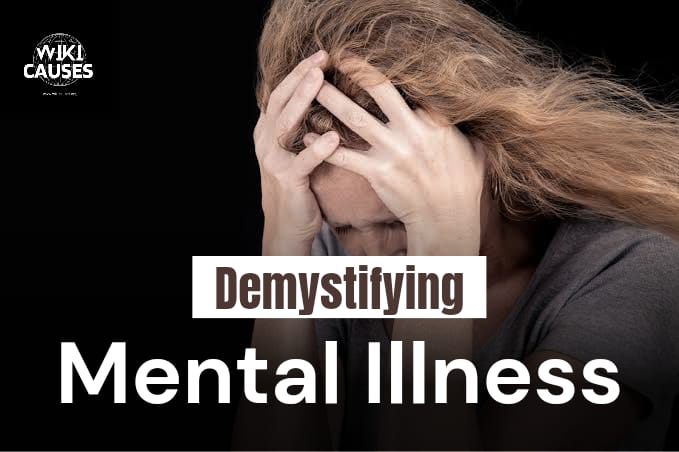Demystifying Mental Health Issues

A year ago, I lost a dear friend to an accident that can be connected to her mental health experiences.
In today’s fast-paced and complex world, the conversation surrounding mental health has gained significant attention. Mental health issues, once largely stigmatized and misunderstood, are now recognized as vital aspects of overall well-being.
Just as we prioritize our physical health, it’s now very important to understand and address our mental well-being. From anxiety and depression to more severe conditions like schizophrenia, and mental health issues. This encompasses a wide spectrum of experiences that impact thoughts, emotions, behaviors, and relationships.
So here is the question, what is the cause of mental health crises?
Read more: Nigerian Health Care Bill
Table of Contents
The Genetic Chain: Does it Runs in the Family
Imagine that our bodies are like a puzzle made up of tiny pieces called genes. These genes carry instructions that tell our bodies how to work, grow, and develop. Sometimes, just like how we might inherit certain physical traits from our parents (like the color of our eyes or hair), we can also inherit the way our brains work from our family.
When we talk about mental health issues being genetically transmitted, it means that there’s a chance that some of these gene instructions might be passed down from our parents or other family members. These instructions can sometimes affect the way our brain functions and how we feel, think, or behave.
For instance, if someone in your family has experienced things like anxiety or depression, it’s very possible that you might have a higher chance of experiencing those feelings too because of the instructions in your genes. It’s like having a little piece of that puzzle from your family’s mental health.
However, it’s important to remember that genes are just one part of the puzzle.
Our environment, experiences, and how we take care of ourselves also play a big role in how our mental health develops. So, even if you have some genes that might make you more likely to have a certain mental health issue, it doesn’t mean you will definitely experience it. Just like with physical health, taking care of ourselves can make a big difference in how we feel mentally too.
Childhood Experiences: Trauma Time Travel
Imagine that our minds are like houses that are being built when we’re kids. The things we experience during childhood, both good and bad, are like the bricks that make up the walls of our house.
Remember that time you fell off the swing and got a scraped knee? Well, sometimes life serves up bigger curveballs. Childhood traumas, like living in a house of broken crayons, and can mess with your mental canvas. Whether it’s witnessing parental conflicts or facing school bullies, these early-life adventures can leave lasting imprints on your mental landscape.
Now, if a child goes through something really tough or scary, like being in a car accident or facing a very stressful situation, that experience can be like a big crack in the wall of their mind’s house. This crack is called “trauma.”
As the child grows up, this crack can cause problems. Just like a crack in a real house can make it hard to keep the rain and wind out, a crack in the mind’s house can make it hard for the child to feel safe and calm. This can lead to feelings like sadness, anger, anxiety, or even trouble trusting others.
Sometimes, these feelings can stick around even when the child becomes an adult. The cracks from childhood trauma can affect how the mind’s house is built as they grow up, making it more likely for them to have mental health issues like depression, anxiety, or difficulty managing their emotions.
But here’s the important part: just like we can fix a real crack in a house with the right tools and help, people can heal from childhood trauma too. Therapy, talking about their feelings, and finding supportive people to help them can be like the tools that help fix the cracks and make the mind’s house stronger and healthier.
Brain Chemistry: The Hormonal and mood swings
Think of your brain as a big mixing pot with different chemicals inside. These chemicals are like messengers that help your brain send signals and control your emotions and feelings.
Sometimes, the balance of these chemicals can get a bit messed up. This can happen due to various reasons, like the way your brain naturally works, things you’ve been through in life, or even changes in your body’s hormones (which are like little helpers that tell your body what to do).
When the chemical balance gets off-kilter, it can lead to mood swings. Imagine your emotions are like a roller coaster: one moment you might feel really happy, and the next moment, you might feel sad or angry. These mood swings can be a bit extreme and happen more often than they would for most people.
These imbalances in brain chemistry, mood swings, and hormones can sometimes contribute to mental illnesses. For example, depression might happen when certain brain chemicals related to feeling good, like serotonin, are low. This can make a person feel really down and unmotivated for a long time. Similarly, anxiety might occur when there’s an overload of certain signals in the brain that trigger excessive worry or fear.
These mental illnesses can have effects on how someone thinks, feels, and behaves. They might have trouble concentrating, feel overly sad or nervous, or even have physical symptoms like a fast heartbeat or trouble sleeping.
The good news is that just like you’d go to a doctor if you had a cold, you can also get help for mental illnesses. Doctors, therapists, and counselors can work with you to find ways to balance those brain chemicals, manage mood swings, and help you feel better overall. Sometimes, therapy, medications, or a combination of both can be like tools that help get everything back in balance.
Modern-Day Treadmill: Stress on Steroids
Let’s talk about stress! Imagine your brain like a control center that manages everything you do. When you encounter something challenging or demanding, like a big test or a difficult situation, your brain sounds an alarm and says, “Hey, we need to be on high alert!”
Let’s face it—life can be one heck of a stress fest. Between work deadlines, endless Zoom meetings, and keeping up with Kardashian-level social media, stress can pile up like dirty laundry. Chronic stress can light the fuse for mental health issues to explode into the scene.
This alarm system triggers what we call “stress.” It’s like your brain’s way of getting you ready to face a challenge. Your body releases special chemicals, like adrenaline, which can make your heart beat faster and give you extra energy. This can be really helpful when you need to react quickly, like if you’re running away from a wild animal.
However, sometimes our brains can get a bit too “trigger-happy” with the stress alarm. This can happen if we’re dealing with lots of challenges at once or if we’re constantly worried about things. When this happens, stress can start to feel overwhelming and affect our mental and physical well-being.
Too much stress over a long time can lead to all sorts of problems. It can make you feel really tired, anxious, or even sad. Your body might start to feel tense, and you might have trouble sleeping or concentrating. Stress can even mess with your stomach and make your heart race.
In some cases, prolonged and intense stress can contribute to mental health issues like anxiety or depression. It’s like your brain and body are worn out from being in “high alert” mode for too long.
Managing stress is super important. Just like you take care of your body by eating well and exercising, you need to take care of your mind too. Techniques like deep breathing, meditation, talking to friends or family, or even seeking professional help from therapists can all help you handle stress better. Remember, it’s normal to feel stressed sometimes, but finding healthy ways to cope can make a big difference in how you feel.
Lifestyle Choices: The Good, The Bad, and The Netflix
We all have our vices.
Lifestyle choices play a significant role in our mental health. Think of your lifestyle as the collection of habits and choices you make every day that can either contribute positively or negatively to how you feel mentally and physically. Here are some lifestyle factors and how they can impact your mental health:
- Healthy Eating: Just like your body needs nutritious food to function well, your brain also benefits from a balanced diet. Nutrients like omega-3 fatty acids found in fish and certain vitamins in fruits and vegetables can support brain health. Eating regularly and avoiding excessive sugar and highly processed foods can help stabilize your mood and energy levels.
- Regular Exercise: Physical activity isn’t just good for your body; it’s great for your mind too! Exercise releases chemicals in your brain called endorphins that can boost your mood and reduce feelings of stress and anxiety. Regular workouts can improve your self-esteem and help you manage your emotions better.
- Adequate Sleep: Getting enough quality sleep is crucial for mental health. When you’re well-rested, you’re better able to handle stress, think clearly, and regulate your emotions. Poor sleep can lead to irritability, and difficulty concentrating, and even contribute to conditions like depression and anxiety.
- Social Connections: Spending time with friends, family, and loved ones can have a positive impact on your mental health. Human connection and support can help you feel valued, understood, and less lonely. Isolation, on the other hand, can contribute to feelings of depression and anxiety.
- Stress Management: Learning how to manage stress effectively is important. Engaging in relaxation techniques such as deep breathing, mindfulness, or yoga can help reduce stress levels and promote a sense of calm.
- Limiting Substance Use: Excessive alcohol, recreational drug use, and even excessive caffeine can negatively impact your mental health. They might provide temporary relief but can worsen anxiety, depression, and other mental health conditions over time.
- Time for Hobbies and Enjoyment: Engaging in activities you enjoy and that give you a sense of accomplishment can boost your mood and self-esteem. Hobbies, interests, and creative outlets are important for maintaining a positive outlook.
Conclusion
In the big picture of life, mental health is really important. It’s like a puzzle made up of many pieces, including how our brains work, the experiences we’ve had, and the choices we make.
Understanding mental health helps us see that people’s feelings and thoughts can be complex. Sometimes, things that are hard to see on the outside can be going on inside someone’s mind. Just like we take care of our bodies, we need to take care of our minds too.
Our genes, the things we’ve been through, how our brains work, and even the way we live all influence our mental health. This means that just as we go to the doctor when we’re sick, it’s okay to get help when we’re not feeling well mentally.
Remember, taking care of our minds is important. It’s like having a good tune-up for a car or watering a plant to help it grow. Together, we can make sure that mental health is something we all understand and support.
References:
- National Institute of Mental Health (NIMH) – A leading government organization providing information about various mental health conditions, research, and resources.
- Mental Health America (MHA) – A nonprofit organization offering educational resources, screening tools, and information on mental health conditions and treatment options.
- Mind – A UK-based mental health charity providing information, resources, and support for those experiencing mental health issues.
- Anxiety and Depression Association of America (ADAA) – Offers information about anxiety, depression, and related disorders along with treatment options and self-help resources.
- Centers for Disease Control and Prevention (CDC) – Mental Health – Provides comprehensive information about mental health, including statistics, resources, and tips for maintaining mental well-being.



